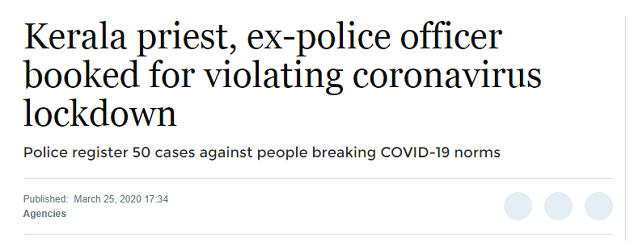Table of Contents



The Indian Penal Code (IPC)
- IPC is the official criminal code of India.
- It is a comprehensive code intended to cover all substantive aspects of criminal law.
- The code was drafted in 1860 on the recommendations of first law commission of India established in 1834 .
- It came into force in British India during the British rule in 1862.
- The Code has since been amended several times and is now supplemented by other criminal provisions.
- Chapter XIV of the Indian Penal Code– ‘Of Offences Affecting The Public Health, Safety, Convenience, Decency and Morals’
- How many chapters in IPC?
Section 269
- Negligent act likely to spread infection of disease dangerous to life.
- Whoever unlawfully or negligently does any act which is, and which he knows or has reason to believe to be, likely to spread the infection of any disease dangerous to life, shall be punished with imprisonment of either description for a term which may extend to six months, or with fine, or with both.
Section 270
- Malignant act likely to spread infection of disease dangerous to life.
- Whoever malignantly does any act which is, and which he knows or has reason to believe to be, likely to spread the infection of any disease dangerous to life, shall be punished with imprisonment of either description for a term which may extend to two years, or with fine, or with both.
- Note -malignant indicates a deliberate intention on the part of the accused.
Article 271
- Disobedience to quarantine rule Whoever knowingly disobeys any rule made and promulgated by the Government for putting any vessel into a state of quarantine, or for regulating the intercourse of vessels in a state of quarantine with the shore or with other vessels, or for regulating the intercourse between places where an infectious disease prevails and other places, shall be punished with imprisonment of either description for a term which may extend to six months, or with fine, or with both.
- Both Section 269 and 270 have been used for over a century to punish those disobeying orders issued for containing epidemics.
- The Sections were enforced by colonial authorities during outbreaks of diseases such as smallpox and bubonic plague.
- In an 1886 case at the Madras High Court, a person was held guilty under Section 269 for travelling by train despite suffering from cholera.
- Another person who bought the train ticket was also held guilty.
Recent Use
- In March 2018, the Health Ministry said that failure by clinical establishments to notify a tuberculosis patient to the nodal officer and local public health staff can be punished under Section 269 and 270.
- While tuberculosis was made a notifiable disease in India in 2012, there was no provision for penal action.
COVID 19 pandemic
- During the coronavirus outbreak, penal provisions, such as Sections 188, 269 and 270 of the IPC, are being invoked to enforce the lockdown orders in various states.
- Section 188 – disobedience to order duly promulgated by public servant


Latest Burning Issues | Free PDF






















 WhatsApp
WhatsApp